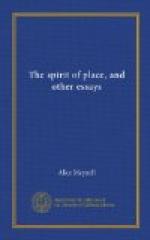Olivia, then, plays her common trick upon the harmless Williams, her father conniving, with a provision that he urges with some demonstration of virtue: she shall consent to make the farmer happy if the proposal of the squire be not after all forthcoming. But it is so evident her author knew no better, that this matter may pass. It involves a point of honour, of which no one—neither the maker of the book nor anyone he made—is aware. What is better worth considering is the fact that Goldsmith was completely aware of the unredeemed vulgarity of the ladies of the Idyll, and cheerfully took it for granted as the thing to be expected from the mother-in-law of a country gentleman and the daughters of a scholar. The education of women had sunk into a degradation never reached before, inasmuch as it was degraded in relation to that of men. It would matter little indeed that Mrs. Primrose “could read any English book without much spelling” if her husband and son were as definitely limited to journeyman’s field-labour as she was to the pickling and the gooseberry wine. Any of those industries is a better and more liberal business than unselect reading, for instance, or than unselect writing. Therefore let me not be misunderstood to complain too indiscriminately of that century or of an unlettered state. What is really unhandsome is the new, slovenly, and corrupt inequality whereinto the century had fallen.
That the mother of daughters and sons should be fatuous, a village worldling, suspicious, ambitious, ill-bred, ignorant, gross, insolent, foul-mouthed, pushing, importunate, and a fool, seems natural, almost innocently natural, in Goldsmith’s story; the squalid Mrs. Primrose is all this. He is still able, through his Vicar, in the most charmingly humorous passage in the book, to praise her for her “prudence, economy, and obedience.” Her other, more disgusting, characteristics give her husband an occasion for rebuking her as “Woman!” This is done, for example, when, despite her obedience, she refuses to receive that unlucky schemer, her own daughter, returned in ruins, without insulting her by the sallies of a kitchen sarcasm.
She plots with her daughters the most disastrous fortune hunt. She has given them a teaching so effectual that the Vicar has no fear lest the paltry Sophia should lose her heart to the good, the sensible Burchell, who had saved her life; for he has no fortune. Mrs. Primrose begins grotesquely, with her tedious histories of the dishes at dinner, and she ends upon the last page, anxious, amid the general happiness, in regard to securing the head of the table. Upon these feminine humours the author sheds his Vicar’s indulgent smile. What a smile for a self-respecting husband to be pricked to smile! A householder would wince, one would think, at having opportunity to bestow its tolerance upon his cook.




